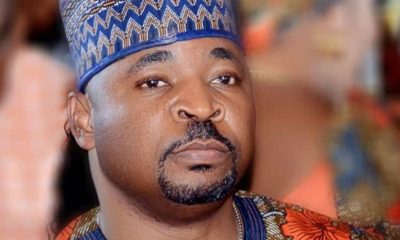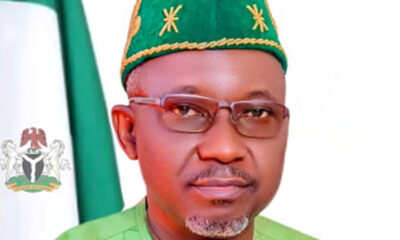News
UK bans Nigerian students, others from bringing dependants

UK bans Nigerian students, others from bringing dependants
The Home Office of the United Kingdom has announced the commencement of the implementation of its policy banning Nigerian students and other overseas students from bringing in dependants via the study visa route.
The Nation had in May 2023 reported that the United Kingdom put in place a law to stop Nigerian students, and others studying in the UK from bringing family as dependents except under specific circumstances.
In a post on X (formerly Twitter), on Monday, January 1, 2024, the Home Office reiterated that only those on postgraduate research or government-sponsored scholarship students will be exempted from the development.
“We are fully committed to seeing a decisive cut in migration. From today, new overseas students will no longer be able to bring family members to the UK. Postgraduate research or government-funded scholarships students will be exempt,” the Home Office said.
This is as the UK government aims to bring down immigration into the country which stands at about one million.
Under the new rule, the UK will remove the permission for international students to switch out of the student route and into work routes before their studies have been completed to prevent misuse of the visa system.
READ ALSO:
- Dangote refinery gets 4th shipment barrels of crude
- UNILORIN extends Post-UTME registration to Jan. 31 – Official
- Deputy Senate President distributes 60 Sharon cars in Kano
A statement on the UK’s Home Office official site adds that the “New government restrictions to student visa routes will substantially cut net migration by restricting the ability for international students to bring family members on all but post-graduate research routes and banning people from using a student visa as a backdoor route to work in the UK.
“The ONS estimated that net migration was over 500,000 from June 2021 to June 2022. Although partly attributed to the rise in temporary factors, such as the UK’s Ukraine and Hong Kong schemes, last year almost half a million student visas were issued while the number of dependants of overseas students has increased by 750 per cent since 2019, to 136,000 people.”
The Home Office also noted that this new rule was not at the expense of the government’s commitment to the public to lower overall migration and ensure that migration to the UK was highly skilled and provided the most benefit.
According to them, the proposal is aimed at allowing “the government to continue to meet its International Education Strategy commitments while making a tangible contribution to reducing net migration to sustainable levels. The government has also made clear that the terms of the graduate route remain unchanged.”
UK bans Nigerian students, others from bringing dependants
News
Just in: Factional Zamfara assembly leaders want governor to represent budget

Just in: Factional Zamfara assembly leaders want governor to represent budget
A factional House of Assembly has emerged in Zamfara state with members demanding the re-presentation of the 2025 Appropriation Bill by Governor Dauda Lawal.
The group, made up of nine lawmakers who were suspended in February 2024 over allegations of misconduct, conspiracy, and illegal sitting, convened in Gusau, the state capital, and declared the formation of a parallel legislative body.
At the session, the lawmakers elected Hon. Bashir Aliyu Gummi as Speaker of the factional assembly.
During the sitting, the faction addressed several issues, including the state’s deteriorating security situation, economic challenges, and the recent reports of mass sackings within the state civil service allegedly carried out by the Lawal administration.
READ ALSO:
- 2027: Atiku remains the best to face Tinubu, says Dele Momodu
- NLC to IMF: Your reforms inflict hunger, poverty on masses
- Nigerians deserve truth about electricity, not propaganda, labour slams power minister
The group further demanded that Governor Lawal re-present the 2025 budget, arguing that the process followed in its initial passage was flawed. The governor had originally submitted the N545 billion Appropriation Bill to the widely-known State House of Assembly led by Speaker Bilyaminu Ismail Moriki in December 2024. The bill was passed and signed into law that same month.
Present at Wednesday’s session were Hon. Aliyu Ango Kagara (Talata Mafara South), Ibrahim Tudu Tukur (Bakura), Nasiru Abdullahi Maru (Maru North), and Faruk Musa Dosara (Maradun 1). Others included Bashar Aliyu (Gummi 1), Bashir Abubakar Masama (Bukkuyum North), Amiru Ahmed (Tsafe West), Basiru Bello (Bungudu West), and Mukhtaru Nasiru (Kaura Namoda North).
Just in: Factional Zamfara assembly leaders want governor to represent budget
News
NLC to IMF: Your reforms inflict hunger, poverty on masses

NLC to IMF: Your reforms inflict hunger, poverty on masses
The Nigeria Labour Congress (NLC) has taken a swipe at the International Monetary Fund (IMF) over its policy proposals to Nigeria and other African nations on how to rejuvenate their ailing economies.
Indeed, the NLC pointedly told the IMF that its conditionalities for giving loans to Nigeria and others were inflict pains of hunger and poverty on the masses.
The NLC President, Joe Ajaero, stated this when he received the IMF team team comprising the its Resident Representative for Nigeria, Christian H. Ebeke, and, Axel Schimmelpfennig from Washington, DC.
The purpose of the visit, it was learnt, was to assess how Nigerian workers and the general populace are being affected by the current socioeconomic environment and the hardship resulting from government policies.
The IMF delegation, led by Schimmelpfennig also sought insights from the NLC regarding the state of the labour market in Nigeria. According to them, the information gathered would contribute to the IMF’s annual country report for Nigeria.
Sources at the meeting disclosed that the IMF team acknowledged that the Nigerian government has been grappling with fiscal challenges since assuming office.
They emphasized that the IMF’s recommendations are purely advisory and not mandatory, based on the prevailing realities in each country.
The delegation expressed concern that, often, governments do not follow the IMF’s recommendations to the letter, instead adapting them to align with political objectives. In effect, the IMF attempted to distance itself from the adverse consequences of some recent economic reforms in Nigeria.
READ ALSO:
- Nigerians deserve truth about electricity, not propaganda, labour slams power minister
- INEC may allow Nigerians without PVCs to vote in 2027
- Air Peace suspends flights over NIMET strike
Nevertheless, the IMF team requested continued engagement with the NLC going forward.
Ajaero made it clear that governance should prioritize citizens’ welfare over profit-making.
News
‘Enough is enough’, Tinubu directs security chiefs to stop violent attacks

‘Enough is enough’, Tinubu directs security chiefs to stop violent attacks
President Bola Tinubu has ordered security operatives to end forthwith the violent attacks in some parts of the country, especially in Plateau, Borno, and Benue states.
He gave the directive during a meeting with security chiefs at the State House on Wednesday.
The meeting was attended by Nuhu Ribadu, the national security adviser (NSA); Mohammed Mohammed, director-general of the National Intelligence Agency (NIA); Emmanuel Undianeye, chief of defence intelligence; Oluwatosin Ajayi, director-general (DG) of the Department of State Services (DSS); and Femi Gbajabiamila, chief of staff (CoS) to the President.
Speaking with journalists after the meeting, Ribadu said Tinubu declared that “enough is enough” on the resurgence of violence in some parts of the country.
The NSA said the president directed security chiefs to work with the political authorities in states and at the grassroots level to find a lasting solution to the insecurity.
He said the security chiefs had acted on Tinubu’s previous instructions by meeting with political leaders in the affected communities and states.
The NSA said the meeting offered the security chiefs the opportunity to fully brief the president about the current security situation of the country.
“This time, we were able to sit with him for hours and give a proper briefing. We also took new instructions from him,” he said.
“Insecurity is not only a government problem.
“It also involves the subnational units — the communities, local governments, and especially the governors. The president directed that we work more closely with them.
“Some of these problems are community-related. While not entirely so, that element plays a significant role.
“Mr. President is working hard to ensure that Nigeria enjoys peace and stability. We are not relenting. We will not stop until we get the results he demands.”
On the resurgence of violent attacks in Borno, Ribadu said the terrorists were planting explosives during the period of relative peace in the state.
“This enemy does not give up easily. When there’s peace for a long time, they try to shock the public with an isolated incident,” he said.
The NSA said the security situation in the country is not yet at 100 percent, while noting that there is “significant improvement”.
Since the beginning of the month, many have been killed in some communities in Plateau State.
Benue State has also recorded violent attacks as over 50 people were killed in Ukum and Logo LGAs on April 18.
-

 metro2 days ago
metro2 days agoRivers: Tinubu meets with Fubara, may lift his suspension
-

 metro3 days ago
metro3 days agoBring your children to compete with mine, MC Oluomo challenges those mocking his spoken English
-

 metro2 days ago
metro2 days agoI’m not in supremacy battle with Ooni, says new Alaafin
-

 News3 days ago
News3 days agoTinubu returns to Nigeria after France, UK trip
-

 Business3 days ago
Business3 days agoMarketers count losses as NNPC slashes petrol price
-

 metro3 days ago
metro3 days agoRivers: Fubara’s supporters praise Tinubu’s intervention with emergency rule
-

 metro2 days ago
metro2 days agoBandits attack Kwara North, kill vigilante, six others
-

 Business2 days ago
Business2 days agoNigeria’s gas production increases by 15.6% to 227,931.65 mscf













